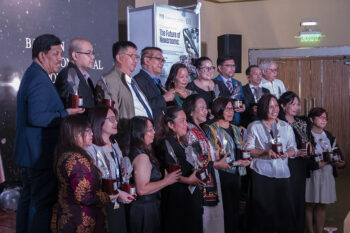GENERAL SANTOS CITY (MindaNews / 24 Oct) – To highlight the significance of the “free-for-all” in the filing of certificates of candidacy for president from October 12 to 16 – the first part of this “COMMENT” series – we considered it as a reflection of wrong political values of the Filipinos. However, beyond the “reflection” are the wrong values at the root of degenerate politics in the Philippines. This is the scope of Part II.
Wrong Political Values
The “free-for-all” in Philippine politics reflects the wrong political values of Filipino voters and aspirants for elective posts. Invoking “freedom”, any Juan or Juana can run for any office as long as he or she meets the legal qualifications set in the Constitution even if utterly incompetent for the position, suffering from physical disability or in state of moral and mental turpitude. In exercising their freedom to elect or be elected, Filipinos give little weight – or none at all – to competence, physical fitness or moral integrity.
For all elective posts, the constitutional qualifications are easy to meet: (1) natural-born citizen of the Philippines; (2) age; (3) able to read and write; (4) registered voter; and (5) residency in the Philippines. Limitation of “age” and “residency” varies according to position. Anyone believed to have met these qualifications has democratic right to run for election – a notion that in disregard of political values is ironically anti-democratic.
Incompetence. Being merely able to read and write does not make anyone competent to fill the office of the president, vice president, senator or district representative. More than mere democratic right is necessary.
The presidency is a position of statesmanship and leadership calling for the highest degree of political competence, moral integrity, enlightenment and expertise in national and international affairs. Yet, a taxi driver, a tricycle driver and a host of unknowns, respectable they may be in their persons but lacking in competence, filed COCs for president – a mockery not only of democratic election but, above all, of the presidency.
The same may be said of the positions of senator and representatives. The Congress is where policies and laws for the political, economic and social welfare of the country are deliberated – new laws proposed and enacted; old ones revised, amended or repealed as political, economic and social circumstances demand. Yet, incompetents have won seats in the House and the Senate.
Sarangani Rep. Emmanuel “Manny” Pacquiao is one example. He was a school drop-out. After winning world boxing titles and the honor of “national hero”, he was given a series of qualifying tests then certified as a high school graduate. As congressman for six years, according to a report, he has no bill passed. When on very rare days he attended sessions, he tried but could not participate in deliberations. Now he is running for senator – the odds of his getting elected despite his incompetence being great.
It should be asked: How many of those who, last week, filed COCs for senator or district representative are merely “read-and-right” or just a little better?
Physical disability: Any aspirant for an elective position must be physically free and fit, in age and health, to carry on the demanding work of the office. Yet, former President Gloria Macapagal-Arroyo, who has been in hospital detention for unbailable crime and a life-disabling ailment since her first term as representative of Pampanga’s second district, was allowed to file her COC for a third term. She is running unopposed – a sign of love of her people, she said.
Sen. Miriam Defensor-Santiago, about two years back, declared herself as sick of lung cancer, stage four. Now, she has declared herself fully cured. On filing her candidacy for president, she was not required to present her doctor’s certifications of her sickness and cure. Refusing to reveal her medicals records, she defies honesty and transparency.
Arroyo and Santiago are just two examples among the present COC filers. The Daily Tribune editor, Ninez Cacho-Olivarez, says Santiago is faking lung cancer and cure by “magic pills”; surely, Arroyo is not. In the past, Sen. Raul Roco ran for president while sick of cancer. He did not finish the campaign and died in the United States while undergoing medication.
Moral Integrity: This is the most vitally important trait of public servants – from the president down to lowest position in the local governments – elective, appointive, civil service. If we look into our political system and our top elective officials, we will see how moral integrity has been taken for granted. How many among the candidates for the 2016 election will be elected in disregard of moral integrity:
What is moral integrity? “Moral” relates “to principles of right and wrong in behavior”; it “implies conformity to established sanctioned codes or accepted notions of right and wrong”. [Webster’s Collegiate Dictionary]. “Integrity” means “firm adherence to a code of … moral values” or “incorruptibility”; it also means “unimpaired condition” or “soundness”. [Webster’s Collegiate Dictionary].
In other words, moral integrity is how a person conducts himself or herself in private life and in relation to others according to ethical norms of society, God’s commandments and just laws and special codes of his or her profession, office and organization. Under the unwritten gentleman’s code, how a person honors his words with deeds.
To persons in public office, moral integrity may be summed up in the doctrine of “Public office is public trust”. This calls for healthy conscience, honesty, dedication, and public interest over self in the performance of official duties. All presidents and high public officials have always invoked in various forms and rhetoric this doctrine as the core of government policies.
Yet, rampant corruption in government shows the lack of moral integrity in most – most to the utmost – of Philippine public officials. A testimony to that is the number of high public officials – elective, appointive, military, police – being investigated, including the vice president, suspended or dismissed by the Ombudsman due to multi-million- or billion-peso corruption.
Mockery of moral integrity in government, politics, the electoral system as much as in the private sector has long been with us. In 1946, then Sen. Lorenzo Tañada warned the nation’s leaders against moral degeneration already evident among the Filipinos and their leaders. History proved him right.
In the executive branch:
Commonwealth President Osmeña, Sr. lost to Manuel A. Roxas in the first election after World War II in 1946 – the last for the commonwealth and the first for the republic president – on the issue of corruption; his men sold the WW II reparation goods. All presidents after Roxas to Diosdado P. Macapagal lost in their reelection bids due to corruption. Ferdinand E. Marcos methodically used the resources of his office to get reelected; he used corruption to beat the issue of corruption.
President Corazon C. Aquino restored democracy after toppling Marcos. She abolished the Congress and replaced all local government executives with OICs (Office in Charge). But she failed to cleanse her own people of corruption and to stop the return of corrupt Marcos politicians to power. For some time after the end of his term, President Fidel V. Ramos, her anointed successor, was haunted by charges of corruption.
President Joseph Estrada openly mocked moral integrity. He flaunted his having mistresses – seeing no wrong as long as they are well supported. He might not have pocketed public funds but evidently, he used his position to amass millions of pesos from other sources – building a luxurious mansion for one of his mistresses. He held midnight to dawn drinking and gambling sessions with his cronies – his second cabinet. Forced out from office, he was convicted of plunder but immediately got a presidential pardon.
President Macapagal-Arroyo was the greatest disappointment. In her impromptu inaugural speech at EDSA II, she promised to reform the government only to deform it ala Marcos during her nine and a half years in Malacañang. Like Marcos, she handed out “brown envelops” to buy political support. Corruption flourished. That she rigged the 2004 election to remain in power was most evident.
President Benigno S. Aquino III, despite the evident gains of his vaunted “Daang Matuwid” (Straight Path) policy, cannot claim to have eradicated corruption. In fact, he has admitted his six-year term is just a beginning that must be continued. A few in his cabinet have been cited for corruption.
Will the Filipinos elect in May 2016 a president possessing the highest degree of moral integrity who will be able to raise moral integrity in the Philippine political system and most necessarily among Filipinos?
(Next: Moral Integrity in the Congress)
(“Comment” is Mr. Patricio P. Diaz’ column for MindaViews, the opinion section of MindaNews. The Titus Brandsma Media Awards recently honored Mr. Diaz with a “Lifetime Achievement Award” for his “commitment to education and public information to Mindanawons as Journalist, Educator and Peace Advocate.” You can reach him at patponcediaz@yahoo.com.)







